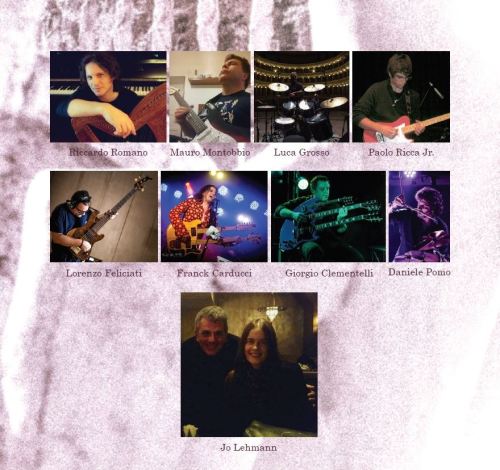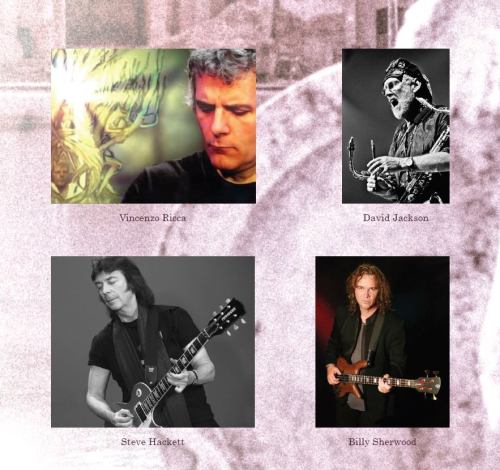
The Rome Pro(G)ject | Of Fate And Glory II
Label: Independent/TRP
Release Year: 2016
Country: International
Genre: Progressive Rock
Band Members
Steve Hackett – Electric & Classical Guitars
David Jackson – Saxophones & Flutes
Billy Sherwood – Bass Guitars/Drums & Electric Guitar
Vincenzo Ricca – Keyboards
With Riccardo Romano and Daniele Pomo of Ranestrane,
Mauro Montobbio and Luca Grosso of Narrow Pass,
Franck Carducci, Paolo Ricca.
Special guest appearance by Joanna “Jo” Lehmann Hackett – (guiding voice on “Of Fate and Glory”).
Contact Links
The Rome Pro(G)ject Official Website
The Rome Pro(G)ject Official Facebook Page
The Rome Pro(G)ject Official Youtube Channel


I have heard concept albums that touch on the time of The Roman Empire over the years. It is usually mentioned in a lyrical form telling a story verbally. Never before have I encountered a almost strictly instrumental conceptual album exclusively concerning The Roman Empire until now. Vincenzo Ricaa -Keyboards and a all star line up of Yes’ Billy Sherwood and Steve Hackett to name a few have released a album called The Rome Pro(G)ject Of Fate And Glory.
The Rome Pro(G)ject Of Fate And Glory, is all about the origins, the growing pains, the betrayal and the expansion of the most advanced empire within the history of the world. However the story is told through the emotions of the individual tracks that brilliantly run concurrent with smooth transitional segue’s from one track to the next. To have a subject as complex as the Roman Empire in of itself with lyrical content telling the story would be enough for normal artists. However to take the huge risk of attempting to convey such subject solely on its instrumental merit alone would appear to be madness and lunacy to the average listener.
I will not lie to you the reader and potential listener, this will require a huge open heart and objective mind along with some general research of the subject of The Roman Empire to grasp it as the artists intended. To those that are either history enthusiast’s or those who just enjoy quality instrumental progressive rock, you are in for a treat with this album. There are 11 tracks that encompass this brilliant and intelligent soundscape atmosphere. The project itself has a traditional progressive rock backbone with modern neo-progressive elements. This is just a massive challenge on a instrumental level to tell the almost 900 year history of the Roman Empire.
The album opens up with by Joanna “Jo” Lehmann Hackett – (guiding voice on “Of Fate and Glory”). Here she is very eloquently articulate in her description of the origins of the Roman Empire. It gives the listener the appearance of a introductory playbill to a stage play as she dictates the coming tracks on the album. This track would lead up to the following track The Wolf And The Twins.
The Wolf And The Twins begins as a lush keyboard led piece of music that quickly moves into more traditional progressive rock layers and atmospheres. This track is highly on the neo-progressive side. It is arranged in such way however where it just sounds like the origins of something to come. The drums/bass rhythm section certainly anchor this one.
The Seven Kings Of Rome opens with a nice lush keyboard and obvious bass/drum rhythm section. They participate on a interchange of various off and on time signatures. This track is one of the more evolving tracks. There is a great set of bridges and passages played in such a way that it never sounds the same throughout the project.
Seven Hills And A River opens up with a solemn ans subtle harp. This is accented with a lush ethereal atmospheric keyboard section giving the track more and more depth as it progresses. Soon a very smooth yet subtle bass/drum rhythm section runs perfectly concurrent with the lush stringed section between the keyboards and harp. In this track I finally here the harp presented the proper way in progressive rock. The harp does not really need a classical register to be used effectively. The harp can be utilized in the stringed section as much as any 6,7 or 12 stringed guitar can and does. About the 6:45 mark the keyboards in a very uncanny way are used to represent a human style choir.
Forum Magna opens with a subtle flute that is soon carried away like the wind with a lush straight forward keyboard atmosphere. The keyboard sets up a little darker progression and time signature. This track is all about the the keyboard atmospheres with the bass/drum rhythm section coming in as a novice element. It makes one feel like they just entered into the great Roman Forum with a celebratory elation behind them. The flute and other horned sections compounded with the lush keyboards give this track a very traditional classical sound through the filter of current progressive elements.
S.P.Q.R opens with some great guitar atmospheric work. The guitar is like that of a vocal that is trying to tell a story along with how the keyboards interchange with the guitars. This one is definitely a more guitar oriented track. Once again the rhythm section of bass/drum come in only as needed and do not overwhelm the main objective with the guitar telling the story as the center of the track itself.
OVID’S Ars Armatoria begins as a sweet flute solo that is soon met with a great tight rhythm section. The bass starts to become a focal point in this track. Not some much a overwhelming focal point however it is really the backbone among the lush stringed and horned section in harmony with one another. The horned section really comes in strong towards the end of this track with the keyboard sounding almost like a vintage 1970’s style Hammond.
Augustus (Primus Inter Pares ) once again starts with a refined horned section to perfectly match the guitar and keyboard stringed section. In this one it would appear that the stringed and horned section play with perfection with off time signatures yet still achieving the main objective to the track. The rhythm section has quite more of a classical sound to it as well. This track even walks into some areas of contemporary jazz. At this point the project as a collective starts to take shape more as a symphony jazz orchestra.
Haidrianeum opens up with a lush dark and heavy passage as if a mist or fog is settling on Rome. It takes the listener slow yet steady. The guitar once again acts like more of a vocal voice even more so as the darker elements continue to carry the backdrop of the song. The keyboard simulates the sound of a choir as the guitar manipulates the ear into thinking it is a voice.
The Conquest Of The New World (Traianus) starts off in much the passage as the first track Of Fate and Glory giving the listener the full appearance and confirmation that although being a instrumental, the album and project is still a conceptual album. This track re visit’s various passages the listener just experienced.
I will have to say that doing a instrumental concept album on the Roman Empire was very risky. If the listener loves history or just great instrumental progressive rock, this is the album for them. This must be approached with a open and objective heart and mind. This album is not for everyone. I am giving this one a 4.5/5 for sheer effort and world class musicianship.


